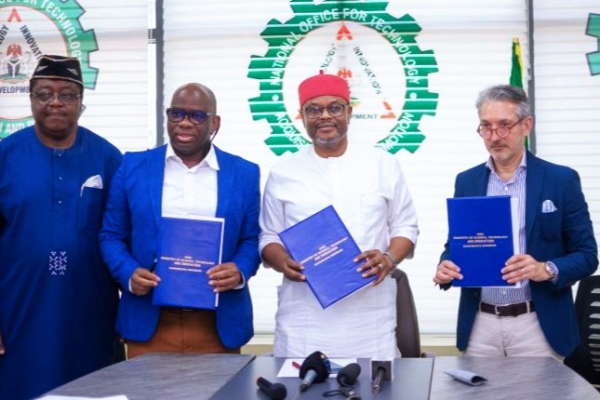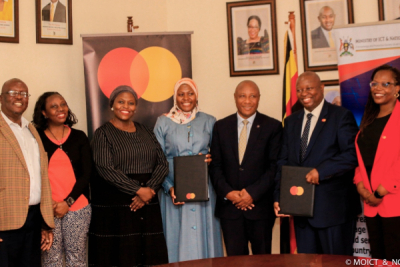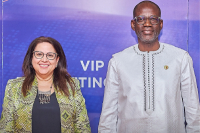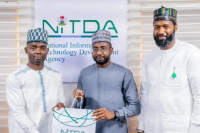
News (1792)
This new session increases the number of skilled labor available in Africa’s booming entertainment industry.
The second cohort of the “Afro VFX” training program, a joint initiative by EM&MB, the Orange Digital Center (ODC), and the Canadian Embassy, was launched on Thursday, February 29, 2024, at the ODC in Abidjan’s Plateau district.
The program, which focuses on training young talent, producing high-quality cinematic works, and fostering the growth of the African industry, will provide thirty individuals with intensive four-month training in special effects (VFX). The goal is to stimulate the creative industries within the audiovisual sector in the region. Upon completion, participants will gain practical experience through internships with local companies and Afro VFX’s partner studios.
West Africa, primarily driven by the Nigerian film industry, releases nearly 3,400 films annually from production studios, making it the continent’s most productive region in audiovisual production, according to Statista. For Eric M'Boua and Dedy Bilamba, co-founders of EM&MB, Afro VFX positions itself as "a key partner in the VFX ecosystem in French-speaking Africa."
Three students from the first cohort won the “Sony Talent League by THU 2022” competition with a 3D animation series called “Djossi Heroes”, which celebrates self-employed informal workers with superpowers.
The Orange Digital Center has long been dedicated to aiding young Ivorians, offering technical support to enhance their skills and realize their projects. Reminding of that commitment, Habib Bamba, Director of Digital and Media Transformation, stated: “The Afro VFX program is the perfect illustration of Orange Digital Center's commitment to the creative and cultural industries, to make digital an opportunity for all, and thus contribute to the development of the film industry.”
Smart citiesin Africa leverage technology to drive progress, enhance quality of life, and foster innovation while promoting sustainable development. They use digital solutions for efficient services, environmental initiatives, and strategic urban planning.
On Tuesday, February 27, Minister Uche Nnaji, representing the Nigerian government, formally sealed an agreement with Domineum/Edenbase UK. This collaboration aims to propel the ambitious Abuja Tech City project forward.
The project, outlined in a comprehensive Memorandum of Understanding (MoU), seeks to transform Nigeria’s technological landscape by drawing inspiration from the remarkable achievements of London Tech City.
Conceived as Abuja Tech Village (ATV) under former President Olusegun Obasanjo's administration, Abuja Tech City is envisioned as a smart and environmentally conscious metropolis that will play host to tech startups, industries, and entertainment ventures. Additionally, it is designed as a Free Trade Zone, aligning with global trends and bolstering Nigeria’s burgeoning tech ecosystem.
“Tech Cities are the catalysts for rapid industrialization and enhancement of operational synergy within critical sectors. For this reason, the federal government is committed to ensuring sustainable industrialization through the establishment of Tech Cities across the country,” said Minister Uche Nnaji.
As Nigeria embraces a tech-driven future, the collaboration with UK developers underscores the nation’s commitment to leveraging international expertise for unprecedented growth and innovation. Abuja Tech City promises to position Nigeria as a competitive global technology hub, fostering progress, prosperity, and a brighter future for all.
Hikmatu Bilali
In his address to the youth on February 11, the Head of State once again urged Cameroonians towards self-employment. It is then essential to provide the technical framework necessary to support the youth in that direction.
On Wednesday, February 28, Jacques Fame Ndongo, Cameroon’s Minister of Higher Education, laid the foundation stone of the digital innovation and business incubation center at the International School of Digital Engineering in Sangmélima, southern Cameroon. The center is a part of the Congo-Cameroon Inter-State University (UIECC) and is being constructed by military engineers. The project, funded to the tune of XAF450 million (US$743,000) by the Development Bank of the Central African States (BDEAC), is one of the eleven priority integration projects in the CEMAC region.
The two-story center, spanning approximately 1,675 square meters, is designed to identify, support, and assist students and young graduates of the International School of Digital Engineering with digital business startup projects. It will provide entrepreneurship training, networking, mentoring, and administrative services, facilitating the implementation and monitoring of innovation and digital entrepreneurship projects.
According to Marcel Fouda Ndjodo, the coordinator of the Congo-Cameroon Inter-State University and director of the digital engineering school, the school itself is an incubation center where students are already engaged in profitable economic activities. The school, which opened less than five years ago, has reportedly supported around thirty startups by engineering students. The director expressed the school’s ambition to transform Sangmélima into a hub for digital activities.
Cameroon’s new higher education law, enacted on June 25, 2023, redefines the role of university institutions, transforming them into “university companies” and elevating students to “student entrepreneurs” to combat youth unemployment through self-employment. “In a liberal economy like ours, in which the private sector should be the primary provider of jobs, one of the fundamental roles of the university is to support economic diversification through the detection, training, and incubation at the university of potential and future captains and leaders of the primary, secondary, tertiary and quaternary sectors,” said Minister Jacques Fame Ndongo.
The Congo-Cameroon Inter-State University, established on December 21, 2012, by the heads of state of Cameroon and Congo, Paul Biya and Denis Sassou Nguesso, began its training activities in the 2020-2021 academic year with the opening of the Sangmélima Engineering School. The school currently enrolls 450 engineering students, including 250 Cameroonians and 200 Congolese nationals.
The Ugandan government is committed to accelerating digital transformation and supporting all sectors of the economy. To this end, it is multiplying partnerships likely to help achieve this objective.
Mastercard announced on Tuesday, February 27, a memorandum of understanding with Uganda’s Ministry of ICT and National Directions. The agreement aims to stimulate socio-economic development, enhance services, and foster financial inclusion in Uganda.
The partnership includes Mastercard’s technical assistance to bolster the Ugandan government’s efforts toward digitization and financial inclusion. This encompasses the digitization of traditional services like Posta Uganda and the national postal service, to generate new revenue streams and provide integrated, user-friendly experiences.
The collaboration also aims to enhance the capabilities of Ugandan startups, enabling them to thrive in the digital era. Specifically, micro and small merchants will be equipped with the necessary tools to connect to the global digital economy and accept electronic payments, thereby broadening their market reach and reinforcing their contribution to Uganda’s economic growth.
This initiative aligns with Uganda’s digital transformation goals outlined in the “Vision 2040” digital strategy. It seeks to empower citizens by aiming for universal inclusion, sustainable development, economic advancement, and poverty eradication through digital innovation across various sectors.
The partnership aligns with Mastercard’s goal of enhancing financial inclusion by integrating one billion unbanked and underserved individuals into the digital economy by 2025. This includes empowering 50 million micro and small traders and supporting 25 million businesses owned or led by women.
Samira Njoya
In Africa, most women entrepreneurs struggle to obtain financing. Women-owned businesses often lack the capital needed for startup or expansion due to various obstacles.
The World Trade Organization (WTO) and the International Trade Centre (ITC) jointly initiated a $50 million fund, named the Women Exporters in the Digital Economy Fund (WEIDE), on February 25, Sunday. The fund is designed to promote digital technology adoption among women entrepreneurs, not only in Africa but also in other developing and least-developed nations. Its ultimate aim is to enable women to leverage the opportunities presented by international trade and the digital economy.
For Pamela Coke-Hamilton, ITC's Executive Director, the fund will help women to raise the capital they need for their businesses. "Time and time again, women in developing countries tell us that access to finance is a key barrier to trade. With this new Fund, women entrepreneurs will have the resources they need to do business across borders and online," she stated.
In Africa, women entrepreneurs often struggle to access bank loans and capital due to social norms, discriminatory policies, and a lack of collateral. This fund, initially backed by a $5 million contribution from the United Arab Emirates, aims to overcome these challenges.
The fund’s launch is a step towards empowering women in commerce and assisting them in developing and promoting their online businesses. According to WTO Director-General Ngozi Okonjo-Iweala, digital trade, particularly trade in digitally delivered services, has been the fastest-growing segment of international trade since 2005, with an average growth rate of 8%.
"Digitalization presents us with unprecedented opportunities to empower women entrepreneurs, level the playing field, and foster inclusive growth," said Ngozi Okonjo-Iweala.
Samira Njoya
The strategic partnership was inspired by Tencent's Weixin/WeChat ecosystem and its billion monthly active users.
Orange wants to double the adoption of its Max it super-app by 2025. To this end, the French group decided to sign a partnership with China's Tencent Cloud on Tuesday, February 27 at the Mobile World Congress in Barcelona, Spain.
Orange will leverage "Tencent Cloud's Mobility framework and the Tencent Cloud Mini Program Platform (TCMPP) solution to create an open platform for Max it, enabling the integration of a wide range of mini-apps within its super-app." The aim is to enrich the Max it ecosystem and enhance the customer and partner experience for businesses and people in Africa and the Middle East.
Commenting on the partnership, Jérôme Hénique, CEO of Orange Middle East and Africa, said: "This partnership with Tencent Cloud is a key step in our vision to offer innovative and high value-added services to our users. Enriching Max it with innovative mini-apps is key to strengthening its value proposition, increasing its penetration among Orange and non-Orange customers, and amplifying our social impact."
Max it, launched last November, is a super mobile application that aggregates all the services offered by Orange and its partners. The French company aims to position its super-app in this part of the world as a hub for all mobile services. Deployed in half a dozen countries at launch, it will expand to eight more destinations in the first quarter of this year, before covering all the countries where the group operates before the end of the year.
Adoni Conrad Quenum
The Mobile World Congress opened in Barcelona, Spain, on Monday, February 26, offering an opportunity for technology companies to sign strategic partnerships to support their growth in various regions of the world.
Orange Middle East and Africa and Microsoft signed a Memorandum of Understanding to support digital transformation initiatives in 17 African and Middle Eastern countries. The memorandum was announced, Wednesday, at the Mobile World Congress in Barcelona, Spain.
"This collaboration with Microsoft is a significant step in our commitment to support the digital transformation of African businesses. By combining our network and Microsoft’s solutions, we can provide SMEs with the tools and guidance they need to thrive in the digital economy," said Jérôme Hénique (pictured, left), CEO of Orange Middle East and Africa.
Under that agreement, Microsoft will leverage the Orange network to offer Microsoft solutions such as Microsoft 365, Copilot, Azure, and Dynamics 365 to approximately 15,000 SMEs in 2024 and ultimately to 1 million. The two companies will collaborate on training, marketing, and sales support programs, and establish a steering committee to track progress using performance indicators.
Microsoft, like Orange, continues to invest in the continent. Besides announcing the construction of a new data center in South Africa earlier this month, Microsoft has partnered with several African countries to drive digital transformation. This includes Kenya, where the company will integrate its cloud solutions into public administration e-services, and Nigeria, where it aims to enhance the digital skills of civil servants across various ministries in collaboration with a local partner.
Adoni Conrad Quenum
Africa needs a skilled workforce to effectively achieve its digital transformation. It can count on the World Bank and its partners, committed to supporting its endeavors.
The Smart Africa Digital Academy (SADA) has received a $20 million grant from the World Bank to expand its activities across Africa, as part of the West Africa Regional Digital Integration Program (WARDIP).
The World Bank funding will support a project that expands upon the existing foundations of SADA and the AReg4DT program. It will train a new generation of African policymakers and regulators, equipping them to utilize the potential of green and inclusive digital transformation through innovative approaches to policy and regulation.
"With this aim, the scale-up will reach 30,000 unique policymakers and decision-makers from all African countries, with a targeted participation level of females at 40%. Given the World Bank’s commitment to digital transformation in Africa, the grant will significantly contribute to regional integration and rapid adoption of the Single Digital Market for Africa," says the Smart Africa press release.
This grant builds upon previous World Bank and SADA collaborations aimed at building digital capabilities in Africa. In November 2023, for instance, the World Bank announced $266.5 million in funding for similar purposes and also for internet access expansion and a single West African digital market.
Initially launched by the Smart Africa Alliance with funding of around $30,000, SADA has already made remarkable progress. Since August 2020, it has offered online training for decision-makers and policy-makers, helping to improve digital skills and promote a dynamic learning ecosystem across Africa.
Samira Njoya
Nigeria Launches Ambitious Digital Literacy Program for 40 Million SMEs.
Digitalization is crucial for SMEs as it enhances efficiency, reduces operational costs, expands market reach, and fosters innovation. By adopting digital tools and platforms, SMEs can streamline processes, improve customer engagement, and access valuable data insights, leading to increased productivity and competitiveness.
The National Information Technology Development Agency (NITDA) and the Small and Medium Enterprises Development Agency (SMEDAN) have introduced an initiative focused on enhancing digital literacy among over 40 million Small and Medium Enterprises (SMEs) nationwide. NITDA disclosed the meeting via a post on the social media platform X (formerly Twitter) on February 23rd.
This strategic collaboration seeks to safeguard approximately 70 million jobs and amplify SMEs’ substantial contribution, constituting a formidable 50% of Nigeria’s Gross Domestic Product (GDP).
Beyond mere partnership, the NITDA-SMEDAN alliance reveals an ambitious action plan to establish a comprehensive database crucial for SMEs’ future growth and sustainability. Kashifu Inuwa, Director-General of NITDA, and Charles Odii, Director-General of SMEDAN, envision a multifaceted strategy that not only prioritizes infrastructural advancements but also places significant emphasis on digital literacy.
Acknowledging the transformative potential of digital tools and platforms in reshaping operational paradigms, NITDA and SMEDAN align with the National Digital Literacy Framework (NDLF). Their shared vision heralds an era where digital competence fuels innovation and propels growth within the SME sector. The imminent Memorandum of Understanding (MoU) is poised to solidify these collaborative efforts, providing SMEs representing a staggering 90% of Nigeria’s workforce and business landscape with a robust foundation for prosperity.
As Nigeria embarks on this transformative journey, the NITDA-SMEDAN partnership emerges as a beacon of hope for millions of SMEs, intrinsically linked to the nation’s economic stability. Given the pivotal role SMEs play in Nigeria’s GDP, the success of this initiative holds the promise of a resilient and prosperous future.
Hikmatu Bilali
To help African women seize opportunities in the technology industry, She Code Africa will be implementing a training program in product development and management. The FedEx-funded program aims to reach 100,000 women by 2030.
She Code Africa, a program dedicated to empowering African women in technology, has announced a partnership with FedEx to launch a tech training initiative. The program is open to women from all African countries who are passionate about technology and are between the ages of 18 and 45.
The program offers two training paths. The first is a 2-3 month engineering pathway that covers a range of essential technical courses, including software engineering (web and mobile), cloud engineering, data science and analytics, and hardware engineering such as robotics. The second track offers comprehensive 2-3 month bootcamps designed to equip African women with the knowledge and skills needed to design and manage products.
Funded by FedEx, the program also provides career mentoring, a one-month paid internship for practical experience, and job opportunities with leading tech companies. The initiative aims to enable African women to leverage the opportunities offered by the tech industry. By 2030, the program aims to train and integrate 100,000 women and girls into the tech industry. Applications are open until March 8.
Vanessa Ngono Atangana
More...
Technology is indispensable for investment in Africa. It enhances access to information, streamlines processes, and improves transparency, thereby attracting both local and international investors, showcasing potential, and enabling effective participation in the global economy.
Zimbabwe’s Investment and Development Agency (ZIDA) unveiled, on February 22, its groundbreaking digital Do-It-Yourself (DIY) investment licensing system, signaling the nation’s commitment to fostering a business-friendly climate. The innovative platform streamlines investment processes, enticing both local and international investors.
Tafadzwa Chinamo (pictured), CEO of ZIDA, praised the launch as a pivotal moment, emphasizing Zimbabwe’s determination to facilitate seamless investment procedures. The DIY portal reduces the license approval timeline from seven working days to an impressive two to five days. Investors worldwide can now navigate the licensing process remotely, eliminating geographical barriers.
The automated system integrates with various government ministries and departments, ensuring a harmonized regulatory approach. Busisa Moyo, Chairman of ZIDA, underscored the portal’s strategic significance in positioning Zimbabwe competitively on the global investment stage. With swift access to the nation’s abundant opportunities, investors can explore Zimbabwe’s potential with ease.
Zimbabwe’s transition to digital platforms reflects a broader commitment to modernization and efficiency within its regulatory landscape. By simplifying procedures and enhancing transparency, the government aims to instill investor confidence and catalyze economic growth.
Martin Rushwaya, Chief Secretary to President Emmerson Mnangagwa, reaffirmed the government’s resolve to dismantle bureaucratic obstacles and bolster investor protection mechanisms. ZIDA’s digital leap represents a crucial stride toward realizing Zimbabwe’s vision of economic transformation. The nation stands poised to become a beacon of investment opportunity, attracting forward-thinking entrepreneurs and fostering innovation.
The transition to digitalization indicates Zimbabwe's openness to business, and innovation, and its support for entrepreneurship and investment. With this visionary strategy, investors from around the globe can boldly explore the opportunities Zimbabwe offers as the nation advances into the future.
Hikmatu Bilali
African digital financial inclusion remains a challenge. In that context, the new partnership seeks to expand access to financial services.
US Fintech Visa and the GSMA Mobile for Development Foundation (GSMA Foundation) launched the Digital Finance for All (DFA) initiative on Monday during the Mobile World Congress in Barcelona, Spain. This initiative aims to boost digital financial inclusion among 20 million individuals across Africa, Asia, and Latin America by providing targeted educational resources and facilitating access to mobile money services.
The DFA program seeks to equip women, small-scale farmers, and entrepreneurs running nano-, micro-, or small-sized enterprises with essential financial knowledge via technological tools. By doing so, it hopes to enable these groups to leverage mobile money platforms effectively within their respective nations.
"At Visa, we believe that digital payments are critical to including everyone in the digital economy by helping provide access to economic livelihood. Together with the GSMA Foundation, we seek to empower those in underserved communities across the world and provide equal access to help build better financial futures for all," said Chiagozie Nwabuebo, Vice President of Global Growth and Social Impact at Visa.
Despite progress over the past decade, Africa's bank account penetration remains low globally. As a result, many African citizens have increasingly relied on mobile money as a viable alternative form of payment. With the expansion of fintech companies throughout the region, mobile money has become an integral aspect of daily life in Africa.
As per the GSMA's "State of the Industry Report on Mobile Money 2023," the number of active mobile money accounts in Africa rose by 17%, reaching approximately 763 million, while total transactions approached $832 billion - an increase of 22% from 2021. Although growth rates were lower in Latin America and Asia compared to Africa, these markets have also seen significant increases in mobile money usage.
As stated by Ashley Olson Onyango (photo, left), Head of Financial Inclusion and Agri-Tech at the GSMA, “Mobile money can play a transformative role in advancing financial inclusion and resilience for the nearly 2 billion people who remain unbanked globally. However, poor digital and financial literacy is a key barrier to accessing digital financial services, especially for certain population segments like women, farmers, and micro-merchants.”
Adoni Conrad Quenum
The digitalization of education in Africa holds significant promise for revolutionizing educational systems and enhancing learning results. Yet, obstacles persist, including inadequate infrastructure and the imperative to equip educators with proficiency in these emerging technologies.
The University of Johannesburg (UJ) has been awarded a grant of approximately 8.1 million rand ($422,000) by the European Union (EU) to implement the Promotion of Technology Enhanced Learning and Digital Education (Pro-TELDE) project in South African Technical and Vocational Education and Training (TVET) colleges. The project, funded by the EU’s Erasmus program, aims to leverage artificial intelligence (AI) to transform education and foster a culture of continuous learning and innovation.
"Project Pro-TELDE reflects UJ’s commitment to advancing digital education and empowering educators for success in the digital era, driving positive societal change through transformative educational initiatives," said Professor Tankiso Moloi, 4IR Research Chair at Johannesburg Business School, UJ.
The EU funding aligns with UJ’s dedication to digital education. The university has recently made significant strides in AI, ranking sixth among African universities for its contributions to AI research.
As part of the project, vocational education will be offered, as well as training of educators, to equip them with the necessary tools to navigate and excel in this new era. An online repository of validated digital educational resources, specifically designed for South African educators, will be established to serve as a hub of knowledge and innovation, providing them with access to a wealth of information and tools to refine their teaching methods.
This initiative, by equipping educators with the tools and knowledge to adapt to digital advancements and incorporate them into their teaching practices, aims to pave the way for a brighter and more technologically advanced future for South Africa’s education sector.
Samira Njoya
For three days, global telecommunications and technology sector stakeholders will meet to discuss an ever-smart and connected world and exchange insights and innovations.
The Mobile World Congress, in Barcelona, Spain, has drawn nearly 96,000 registrants for this year’s event, which opened on February 26, according to Mats Granryd, Managing Director of the Global System Operators Association (GSMA). This marks an increase from last year’s attendance of approximately 90,000.
The Mobile World Congress 2024 (MWC 2024), officially inaugurated by King Felipe VI, is focusing not only on connectivity but also on all related sectors. "As connectivity brings us together, technology opens possibilities – with connectivity driving a fusion of technology and purpose across all sectors, enabling new possibilities. This week is all about exploring the future's potential for businesses and society," said Mats Granryd.
Artificial Intelligence (AI) is the most prominent segment at this year’s event, with public adoption of generative AI, such as OpenAI’s ChatGPT, gaining traction since its introduction in November 2022. The tech community and governments are currently considering the practical applications, economic implications, ethical use regulations, and safety concerns of generative AI.
Other key topics to be discussed at the event include connected and electric cars, cloud computing, 5G and 6G technology, and the transformation of telecom operators.
MWC 2024 also presents an opportunity to explore the latest tech gadgets, including wrist smartphones, connected watches, laptops, and tablets. Major broadband industry players such as Orange, Vodafone, Telefonica, and China Mobile will be in attendance, along with leading tech companies like Huawei, Samsung, Microsoft, Intel, Amazon, Infobip, and Nokia.
The startup ecosystem is well represented, with a dedicated space for tech entrepreneurs and an African delegation featuring companies like Ghana’s Farmerline, Benin’s FedaPay, and Senegal’s Lafricainemobile.
The event, which concludes on February 29, is expected to foster numerous partnerships for the advancement of global connectivity and digital transformation among private, public, and public-private entities.
Muriel Edjo















